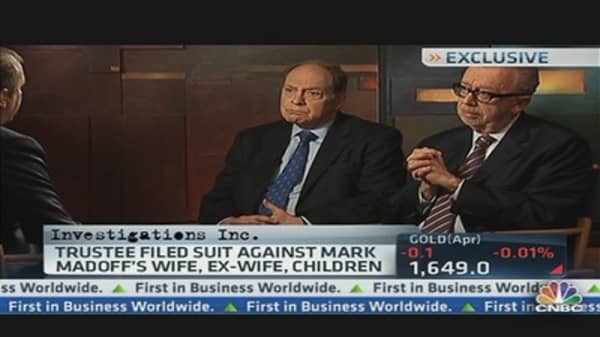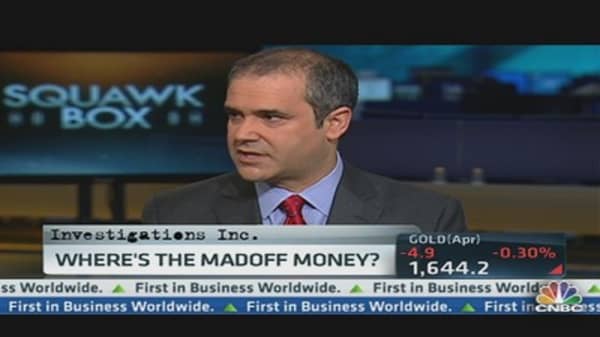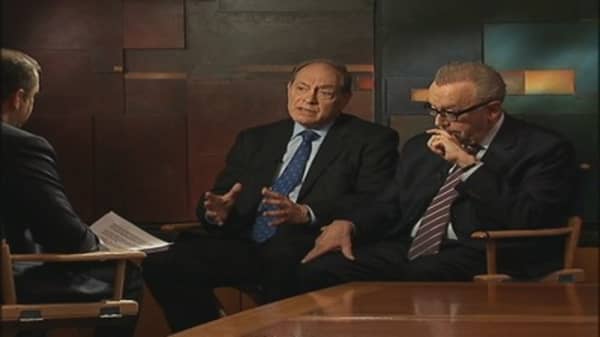Most investors in Bernie Madoff's epic Ponzi scheme initially assumed they had lost everything. But a new distribution announced Tuesday by court-appointed trustee Irving Picard will bring the total amount returned to investors past $5 billion for the first time.
In all, Picard and his team have recovered some $9.3 billion. That is more than half the $17.5 billion in principal Madoff investors lost—something few thought possible when the scam came to light in December, 2008. But even now, new information about the fraud is coming to light.
"I think we have a handle on where the money flowed," Picard told CNBC. "But we're still finding, as we're continuing discovery and doing things in the litigation, that there are a lot of areas that we are still finding. And every day brings something new."
Picard and his chief counsel David Sheehan are partners at BakerHostetler in New York, which has a team of attorneys and employees scouring the world for Madoff-related assets. The firm has billed more than $600 million in fees and expenses, which are paid not by Madoff's investors, but by a Wall Street-funded trust run by the Securities Investor Protection Corporation (SIPC).
(Read More: Madoff Case Is Paying Off for Trustee ($850 an Hour).)
More than four years after the search for assets began, Picard and Sheehan said they have a much different view of the fraud today than they did at the outset.
"The case broke and everyone saw it as an affinity fraud. And it's true, Madoff preyed upon his friends, his family, his relatives, and members of the Jewish community," Sheehan said. "But what we found, by virtue of all of our research and the case that we've built, is that what he really became was part of the financial fabric of the international financial markets."
(Read More: Madoff: Insider Trading Has Gone on 'Forever.')
Madoff—a former non-executive chairman of NASDAQ and a longtime pillar of Wall Street—moved billions of dollars around the world through his Ponzi scheme. But Picard and Sheehan said in the end, Madoff was less a recipient of the money than he was a conduit for others to move money around.
"He was sort of living just below the radar screen, if you will, Picard said. "He had houses in Palm Beach, out in the Hamptons. He had a place in France. He had several yachts. And he had an interest in an airplane. So he had a good lifestyle. But he wasn't living like the super-rich," Picard said.
Picard and Sheehan said others in the industry—including major financial institutions—found Madoff to be a convenient way to move money and make big returns of their own, as long as they turned a blind eye to what Picard and Sheehan claim were obvious signs of fraud.
(Read More: Madoff Behind Bars.)
Sheehan said in a sense, the institutions used Madoff in the same way Madoff used his investors.
"As a matter of fact, the feeder funds, almost all of them were incorporated offshore. Many, many of them had investors that were not in the United States, investors throughout Europe and the Caribbean who were investing, and South America. And all of them were investing in these funds which then, of course, turned and invested in Madoff."
Picard believes one of the biggest offenders has been Madoff's primary bank, JPMorganChase. Madoff made payments to customers from an account at the bank purportedly used to settle trades—even though Madoff later confessed the "trades" were fictitious. The bank, in turn, sold structured funds to investors that were based on Madoff's purported returns.
"Even though there were all these red flags that people such as JPMorgan saw, they turned a blind eye to those because the returns were just too good and they'd been around," Sheehan said.
Picard is appealing a federal judge's 2011 dismissal of nearly all the claims in a $19.9 billion lawsuit against the bank.
JPMorgan has repeatedly said it knew nothing about Madoff's fraud and was, in fact, a victim.
"There is a massive gap between the Trustee's blustering accusation and the facts that he has actually alleged to support them," JPMorgan said in a court filing. "Despite taking extensive pre-trial discovery, the Trustee has still completely failed to allege facts showing that any individual at JPMorgan had actual knowledge of Madoff's fraud."
U.S. District Judges Colleen McMahon and Jed Rakoff ruled in 2011 that Picard did not have the legal authority to make most of the claims against JPMorgan as well as HSBC, which was a major source of funding for Madoff but has denied knowing about the fraud.
Picard and Sheehan said they are optimistic the claims will be reinstated on appeal, and they will ultimately return all of the investors' principal.
"That's certainly our goal," Picard said.
At least one segment of the market is giving him good odds.
A number of large financial institutions and hedge funds are trading in Madoff bankruptcy claims. The current going rate is around 77 cents on the dollar.
"The Madoff claims are better than Greek bonds," Sheehan said.
Since some of the institutions holding the claims are also the subject of litigation, Sheehan believes the higher that trading price goes, the more likely the institutions are to settle the lawsuits.
"They have a real financial incentive to sit down, and many of them are, talking to us about the notion of settling those claims," Sheehan said.
While Picard and Sheehan may be getting help from the claims market, they said they are not getting help from Madoff himself, despite Madoff's promise through his attorney in 2009 to help in the search for assets.
CNBC has confirmed Madoff has made repeated offers of help since then, from the federal prison in Butner, NC, where he is serving a 150-year sentence. But Picard said Madoff has never been much help, even when he and Sheehan went to visit Madoff on two separate occasions.
"In my view, he has not been helpful. The interviews of him were, really, to confirm the information we found because those interviews took place shortly before some of our litigations began and we put this case together the litigation teams and really, from a blank slate," Picard said.
(Read More: Wall Street Jailbirds.)
"There's always the suggestion that there's more that he could help us with," Sheehan said. "But when we pressed his counsel to give us an example of that before we start getting on an airplane and fly down to see him, we never get anything that's worthwhile. So, we have not taken him up on those offers."
"I think he thinks that he's still in control of the situation, so that if you're going to come and interview him he could fix the ground rules. And that's not the situation," Picard said.
Picard and Sheehan said they no longer believe Madoff or members of his family have money secretly stashed away.
"My sense of it is that we found everything that there is to be had from Mr. Madoff and his family," Sheehan said.
(Read More: Madoff's Younger Brother Sentenced to 10 Years.)
—By CNBC's Scott Cohn; Follow him on Twitter: @ScottCohnCNBC








